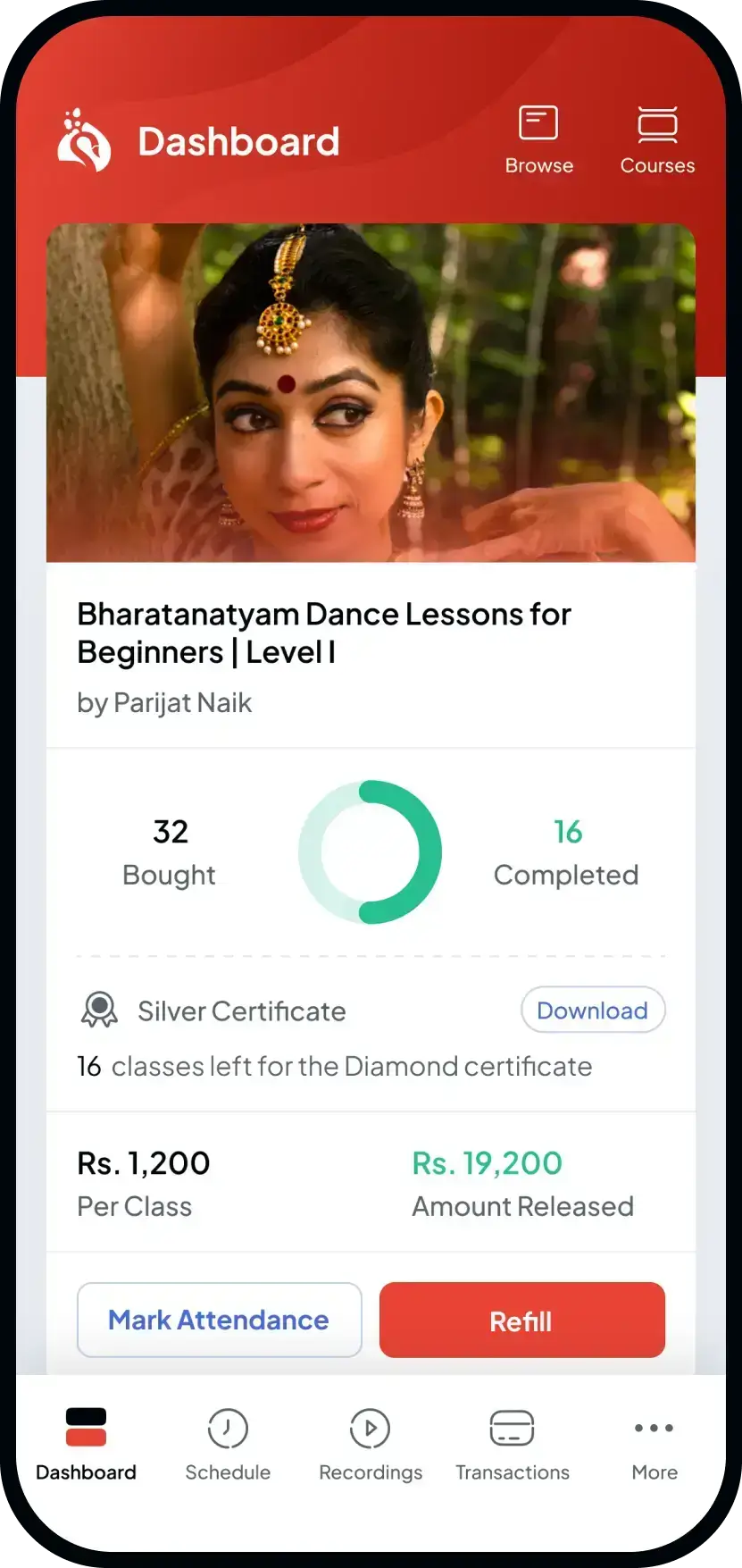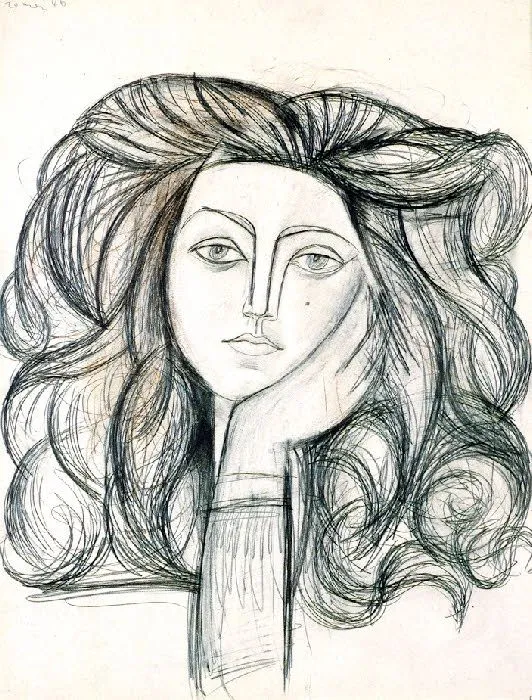Why people love ipassio?
World-class masters as teachers
Personalized & Interactive 1-on-1 classes
Course studio that amplifies learning
Access to the global creative community
Pay as you go - 2 classes at a time
World-class masters as teachers
Personalized & Interactive 1-on-1 classes
Show more
Explore Online Kanjira Courses

Our Happy Learners

Real Progress, Real Impact
Let’s celebrate passion learning
About Online Kanjira Classes
How to learn to play kanjira for beginners?
For beginner students, the most important step is to hold the kanjira instrument correctly. Students need to adjust their grip to make sure the instrument is perpendicular to the hand in which they’re holding the instrument. Knowing Carnatic music basics will help a lot in learning kanjira. For most students, having a teacher who takes them step by step has proven to be the best way of learning kanjira. So, when local classes are not available, they turn to online lessons. This ensures that they have a teacher who guides them regularly and can learn kanjira while sitting at home. Youtube or other pre-recorded videos do not offer personalized guidance which is extremely important in setting the right foundation for beginners.
Why kanjira lessons from ipassio?
Top kanjira players who perform worldwide usually cannot offer private lessons locally since they’d be travelling. Online private lessons are usually the most convenient for them. At ipassio, students get access to such top talent, right from the comfort of their homes. Students also have the option of taking a minimum number of two classes at a time. Our teachers customize the lessons based on the students’ skills and level of knowledge. This lets beginner and advanced students to perform better. Some of the teachers are trained under the renowned Kanjira artist G. Harishankar.
Topics to be covered
The courses begin with a brief history of the instrument as well as Carnatic music in general. Then the students will delve into several playing techniques including hand positioning, finger tapping techniques, etc. Basic structure of talas in Carnatic music style is covered, which will educate them of time based rhythmic patterns. Certain fingering exercises will enable students to play kanjira faster and more precisely. Students will also learn about elements/angas that constitute a tala, which are aghu and avartan, anudrutam, drutam. 4 beat phrases, 8 beat phrases and 16 beat phrases will also be learned by the students.
History of Kanjira instrument
Kanjira is a south Indian percussion instrument of the tambourine family. It is often described as Indian tambourine. Kanjira has also been referred to as ganjira, khanjiri and khanjari. Hand drums had been originated almost 6000 years ago. In India, around 200 and 400 BCE culture of sophisticated drumming began. This was mentioned in sanskrit texts Panchatantra and Natyashastra. The term kanjira is likely to have evolved from Tamil words ‘kanja’ meaning skin and ‘jari’ for small jingling anklet. This term and iconography depicting this instrument were prevalent in the 16th century. This is when the modern kanjira is likely to have been developed.
Popular categories:
Keyboard, Drawing, Bass, Piano, Veena, Sculpting, Salsa, Konnakol, Ukulele, Commercial Music, Trumpet, Spanish, Odissi, Hindi, Portuguese, Ghazal, Harmonium, Pop, Photography, Music Theory, Gujarati Singing, Crochet, Multi-Cuisine, Kathak, English, Sufi Music, French, Sarod, Trombone, Western Classical Music, Acting and Theater, Italian, German, Painting, Sketching, Slide Guitar, Banjo, Indian Cuisine, Accordion, Mohiniyattam, Guitar, Bollywood Dance, Mridangam, Carnatic Vocals, Sitar, Bollywood Singing, Vibraphone, Ghatam, Yoga, Bassoon, Drums, Violin, Calligraphy, Mandolin, Saxophone, Western Singing, Hindustani Vocals, Jewellery Design, Bharatanatyam, Harmonica, Rabindra Sangeet, Electric Bass, Cello, Sanskrit, Santoor, Acrylic Painting, All Singing Styles, Tabla, Flute, Harp, Double Bass
Major cities our students come from :
United States of America : New York, Los Angeles, Fremont, San Jose, Santa Clara, Chicago, Houston, Philadelphia, Phoenix, Dallas, Austin, Denver, Seattle, Detroit, Washington, Boston, Memphis, Nashville, Portland, Las Vegas, Sacramento, Colorado Springs, New Orleans
United Kingdom : London, Birmingham, Leicester, Slough, Leeds, Manchester, Glasgow, Liverpool
India : Bengaluru, Pune, Mumbai, Kolkata, Delhi, Patna, Hyderabad, Chennai, Jaipur
A Kanjira costs approximately Rs. 2300.
Kanjira is a frame drum from the tambourine family. It is an accompanying instrument for South Indian folk music, Bhajans, and Carnatic music concerts.
It is made of the wood of a jackfruit tree, metal, and lizard or goat skin.
With our lessons by the best-seasoned professionals on ipassio, learning the Kanjira will never be difficult. Sign up for our exclusive, 1-on-1 classes where our mentors make sure that you're pursuing your favorite hobby in the best direction.
The best way you could learn the Kanjira is through live lessons, exclusively held for students on ipassio. With premium-quality courses that are carefully curated for students by acclaimed educators, pave your way to learning the Kanjira in the best possible way, from the comfort of your home or any other surrounding of your choice.
A quiet, distraction-free, well-lit room with enough space to comfortably play the Kanjira, with the camera positioned to clearly show your hands and the instrument.
Most online Kanjira classes on ipassio.com typically last between 30 and 60 minutes. Beginner courses are usually scheduled for 30 to 45 minutes due to several reasons. Firstly, at the beginner level, students focus on learning the fundamental concepts. Short and focused sessions make it easier for them to understand each concept deeply, one at a time. Additionally, this duration considers the temperament of children, who often make up the majority of beginners. Since children tend to have shorter attention spans, 30-45 minute sessions help them learn effectively without becoming resistant or bored. As students progress to intermediate and professional levels, the class duration increases to 60 minutes or more, allowing for more advanced instruction and practice.
Teachers usually offer flexible scheduling to accommodate different time zones and personal schedules.
Every student learns at their own pace. During the free introductory meeting and the first few sessions, the teacher will assess your current skill level. Based on this, they will create a lesson plan just for you. The 'About the Course' section gives an outline of what you will learn, but the detailed plan will be adjusted to fit your personal goals and abilities. If you learn quickly, you can move to the next level faster. If you need more time, you can take it without feeling rushed. In these one-on-one Kanjira classes, you won't have to keep up with or wait for classmates. You can ask as many questions as you need to fully understand the material.
Yes, one-to-one online classes to learn Kanjira allow for customization based on your interests and goals.
Kanjira is a significant part of Carnatic music. However, it has seen some incorporation in fusion and world music genres, where musicians blend traditional instruments with contemporary music styles. This fusion has brought some attention to the Kanjira outside of its classical roots, though it still remains predominantly popular within the Carnatic classical music tradition. After completing this online Kanjira course, many professional opportunities may become available to you. You can perform as a solo Kanjira artist in concerts, festivals, and cultural events. You might also accompany vocalists and instrumentalists in Carnatic music concerts, providing rhythmic support and enhancing their performances. Another option is to join musical ensembles or bands that blend traditional and contemporary music, contributing your Kanjira skills. You can also teach Kanjira to students, either in person or through online platforms like ipassio.com. Collaborating with artists from different genres to create fusion music is another exciting possibility. You can also continue your education by pursuing advanced training in other percussion instruments or broader aspects of music theory and performance.
You should set up a daily practice routine. At the beginning, practice for 20-30 minutes each day. Make sure to stick to this schedule. You will be given specific exercises to practice daily.
Teachers may provide video recordings of lessons, written notes, or digital practice aids.
While in-person lessons have certain advantages, online classes offer flexibility and access to the best teachers worldwide, with effective learning facilities through digital tools.
Technical issues can happen from either the teacher’s or your end. In such cases, the class will be rescheduled to another day and time mutually decided between you and the teacher.
You should use gadgets like a desktop, laptop, tablet, or smartphone for attending classes. Make sure you have a stable internet connection. Use the tried an tested video conferencing platforms. Limit the use of bandwidth-heavy applications during the class. Close unnecessary applications and devices that might be using the internet. Lower the video quality or consider switching the video off if necessary to prioritize audio quality, as clear audio is more critical in music lessons. These are some of the ways to deal with the latency issues. For anything related to class scheduling, rescheduling, payment and refund through ipassio website or mobile app, you can contact the support team for prompt assistance.
A reliable internet connection, a computer, smartphone, or tablet with a camera and microphone, and upgraded video conferencing platform like Zoom, Skype, WhatsApp, Botim, Google Duo, Google Meet or ipassio video.
Additional Resources
How ipassio works?

Pick your passion
Ranging from music to creative arts, pick what you love!

Interact with an expert
Connect with your teacher over a free 1-on-1 video call to discuss your learning goals.

Set session schedules
Get session schedule matching your timezone

Pay as you go
2 classes at a time, with no long-term commitments.
Start with a free meeting now!
Pick a Course

Student
Teacher
Download our app and get going with your passion.
Get easy access to the pool of world-class educators, enthusiastic learners and everything exciting!
- Explore hundreds of courses from 400+ teachers
- Enroll easily into the course of your choice
- Mark attendance for every class you have completed
- Buy and refill classes with ease
- Schedule classes as per your availability
- Teachers can easily withdraw their fees












